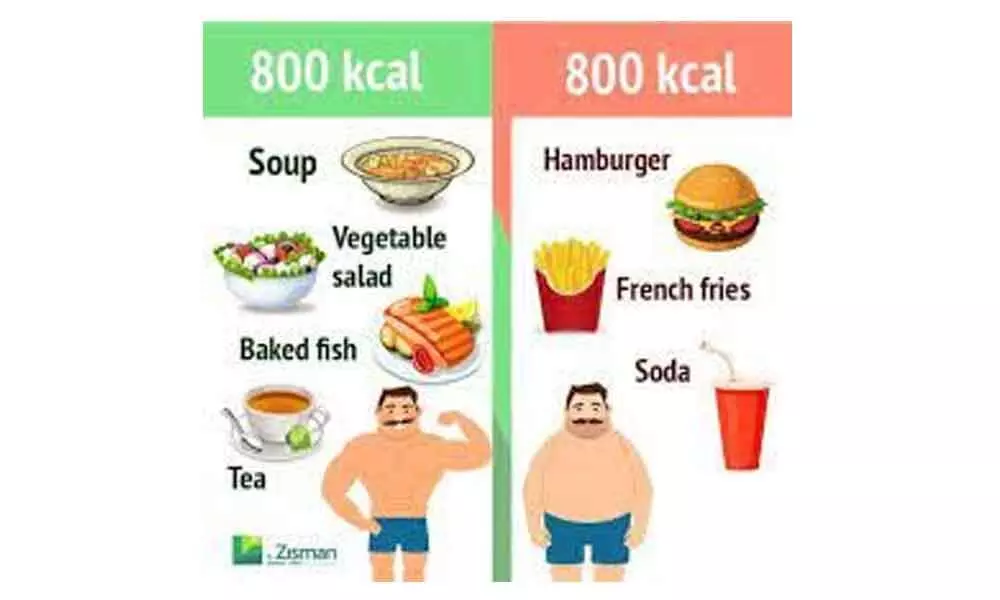Not all calories are equal

There are different ways the kinds of foods you eat matter to your body
Starkville (US): A calorie is a calorie is a calorie, at least from a thermodynamic standpoint. It's defined as the amount of energy needed to raise the temperature of 1 kilogram of water by 1 degree Celsius (2.2 pounds by 1.8 degrees Fahrenheit). But when it comes to health and your body's energy balance, not all calories are equal.
Dietitians like me know there are many factors that influence what a calorie means for your body. Here's what we understand about calories and nutrition so far. Energy actually available to your body. In the late 1800s, chemist WO Atwater and his colleagues devised a system to figure out how much energy – that is, how many calories – various foods contain. Basically, he burned up food samples and recorded how much energy they released in the form of heat. Not every bit of energy in food that can combust in the lab is actually available to your body, though. According to the Atwater system, one gram of each macronutrient is estimated to provide a certain number of calories.
How much energy you use and what you eat can affect what scientists call your body's energy expenditure. That's how much energy it takes to keep you alive – energy you use breathing, digesting, keeping your blood flowing and so on – along with what you exert moving your body. You might have heard this referred to as metabolism.
Those eating very low-carb diets used the most energy, while those eating low-fat diets used the least. In another study, high-fat diets led to lower total energy expenditure than high-carb diets did. Other researchers reported that although substituting carbs for fat did not alter energy expenditure, people who increased their protein intake to 30%-35% of their diet used more energy.
In general, diets high in carbohydrates, fat or both produce a 4%-8% increase in energy expenditure, while meals high in protein cause an 11%-14% increase above the resting metabolic rate. Protein has a higher thermic effect because it's harder for the body to break down. Although these variations aren't huge, they could contribute to the obesity epidemic by encouraging a subtle average weight gain. Dietitians pay attention to a food's glycemic index and glycemic load – that is, how quickly and how much it will increase your blood glucose levels.
The fiber content of food is another thing to consider. Your body can't digest fiber – found in plant foods like fruits, vegetables, whole grains and beans – for energy. So, foods high in fiber tend to have less metabolizable energy and can help you feel full on fewer calories. Empty calories – those from foods with minimal or no nutritional value – are another factor to consider. Things like white sugar, soft drinks and many ultra-processed snacks don't provide much, if any, benefit in the form of protein, vitamins or minerals along with their calories. The opposite would be nutrient-dense foods that are high in nutrients or fiber, while still being relatively low in calories.
Examples are spinach, apples and beans. And don't think of empty calories as neutral. Nutritionists consider them harmful calories because they can have a negative effect on health. Foods that are the biggest contributors to weight gain are potato chips, potatoes, sugar-sweetened beverages and meats, both processed and unprocessed. On the other hand, foods that are inversely associated with weight gain are vegetables, whole grains, fruits, nuts and yogurt. More to health than calories and weight It is indisputable that for weight loss, the difference between the number of calories consumed and the number of calories exerted through exercise is the most important factor. But don't fool yourself. While weight plays a role in health and longevity, weight loss alone doesn't equate to health.
Yes, some high-protein diets seem to promote weight loss at least in the short term. But epidemiologists know that in areas where people live the longest – close to 100 years on average – they eat a primarily plant-based diet, with very low or no animal-based protein and low or moderate fat in the form of mono- and polyunsaturated fats. I often hear friends or clients say things like "it's those carbs that are making me fat" or "I need to go on a low-carb diet." But these complaints drive dietitians like me, well, nuts. Carbohydrates include foods like Coca-Cola and candy canes, but also apples and spinach.
Cutting down on simple carbs like soft drinks, refined-flour bakery items, pasta and sweets will definitely have a positive impact on health. But eliminating carbohydrates like vegetables and fruit will have the opposite effect. A plant-based diet high in plant-based protein and carbohydrates mostly from vegetables, fruit, nuts and legumes is the healthiest diet researchers know of for longevity and prevention of chronic diseases like heart disease, cancer, hypertension and many other conditions.
The modern Western diet suffers from an increase in quantity of calories consumed with a concurrent decrease in the quality of calories consumed. And researchers now know that calories from different foods have different effects on fullness, insulin response, the process of turning carbs to body fat, and metabolic energy expenditure. Where your health is concerned, count more on the quality of the calories you consume than the calorie count.
(The Conversation; Writer works at Mississippi State University, US)










